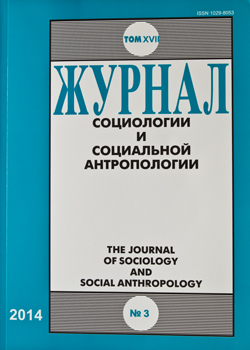The Social Potential of the Northern City: from Ignorance to Recognition
Keywords:
mode of social exclusion, one-industry town, life strategies of the population, poverty, the practice of mutual aid, solidarity, public policy, the Soviet state, Inta
Abstract
This article examines the transformation of the social relations, manifested in shrinking social potential of the territory due to the transition from distributive to selective (liberal) social policy in the conditions of market economy. The author focuses on the depressive northern city with fairly large reserves of natural resources and missed opportunities of diversification of production. The case study materials prove the idea that the modern Russian market intensified the exploitation of natural and human resources of the northern territory. This caused the deformation of the social relations and the formation of community interactions leading to exploitation and social exclusion. Theoretical arguments are based on the ideas of Karl Polanyi, who proved the utopianism of self-regulating market and the inevitable disruption of social relations caused by the subordination of human social nature to the market built on the laws of the price, supply and demand. The author further develops the ideas of Karl Polanyi showing two opposing forces: the market which destroys social links and the human nature trying to preserve them. In the situation of limited opportunities, losing their self-sufficiency and accumulating experience failures, people built protective life strategies and practices of social interaction, which don’t promote the development of the territory. On the contrary, they contradict the values of individualism, freedom and democracy, for the sake of which the transition of the country to the market was carried out. The country’s transition to the market relations split Russian society, led to the creation of many social positions that in the struggle for resources have to merge in a closed social group. Russian society today is a set of closed, weakly interacting social groups, the gap (social distance) between them increases with the level of mistrust and socio-cultural insensitivity. Dissociation of the population contributes to the problems of inequality, increases vertical power relations and dependency, significantly reducing the possibility of activation of human resources. For the sustainable development of social potential it is necessary to recognize the interests of the local community creating conditions for their realization, which is possible only through a connection of distribution policy with recognition policy.
Published
2014-02-20
How to Cite
Lytkina, T. (2014). The Social Potential of the Northern City: from Ignorance to Recognition . ZHURNAL SOTSIOLOGII I SOTSIALNOY ANTROPOLOGII (The Journal of Sociology and Social Anthropology), 17(3), 33–47. Retrieved from http://jourssa.ru/jourssa/article/view/656
Section
Urban Sociology

